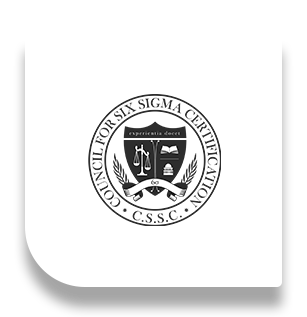Six Sigma
- Government Recognized
- Average Salary $121,510.00
- Quality-Control Process
- Boost Profits
- Team-Focused Approach
- Highly Sought After

Ed
Information Assurance Analyst
(107 Reviews)
Six Sigma promotes the idea that all business processes can be measured and optimized and is a statistical benchmark that shows the level of success of a business process.
The term Six Sigma originated from the field of statistical quality control and the ability of manufacturing processes to produce a high proportion of output within a specification. Six Sigma quality is achieved when long-term defect levels are below 3.4 defects per million opportunities (DPMO).
Six Sigma has evolved into a more general business-management philosophy, focusing on meeting customer requirements, improving customer retention, and improving and sustaining business products and services. A common training and certification program, Six Sigma practitioners may achieve the Six Sigma certification belt levels, ranging from white belt to black belt.
Six Sigma Belt Rankings
Individuals can obtain Six Sigma certification, which solidifies and verifies their professional skills. These certifications are awarded through a belt system similar to karate training. These belt levels are:
White belt: Individuals with a white belt have not gone through any formal training or certification. This belt gives professionals a basic framework, which allows them to take part in certain quality control and waste reduction projects.
Yellow belt: This level provides additional training beyond the white belt level. Yellow belts can become contributing project team members. They may help managers who have higher belts.
Green belt: Those who pass this level must take part in a complete course that trains them to come up with process improvement techniques. The green belt certification is ideal for individuals who work in certain industries, such as project or financial management, as well as health care. Graduates often become project leaders.
Black belt: People who graduate from the green belt level can move up to the black belt certification. Successful graduates can break down and deal with more complex jobs and projects. They are taught how to tackle large-scale changes that can impact their companies through lean Six Sigma projects.
People with black belts can become masters and champions. Someone with a master black belt is considered an expert and strong leader with excellent problem-solving skills. A champion is a lean Six Sigma leader who can maximize profits through the elimination of waste and defects.
You can get certified by going through courses offered by certain schools or companies. Keep in mind, though, that there is no unified standard for the courses. As such, the curriculum for Six Sigma certification varies, which means individual courses can vary depending on the offering entity.
Six Sigma
Belt Rankings
- White Belt
- Yellow Belt
- Green Belt
- Black Belt
Course Components
- Yellow Belt Training Course
- Black Belt Training Course
- Six Sigma Handbook
- Six Sigma Certification Project
- ASQ Certified Six Sigma Pocket Guide
